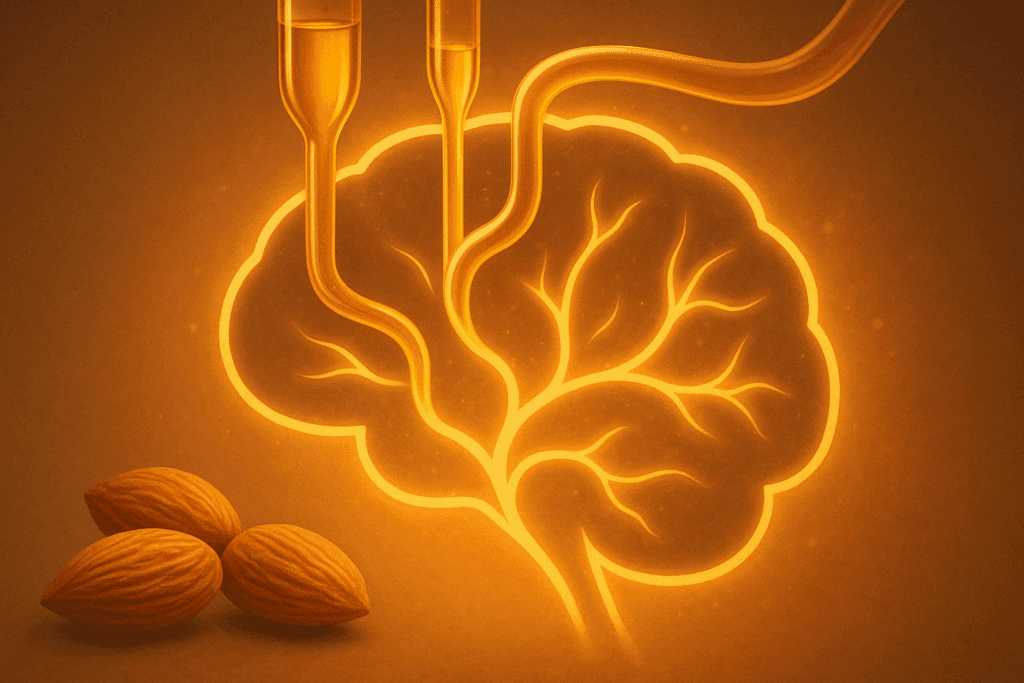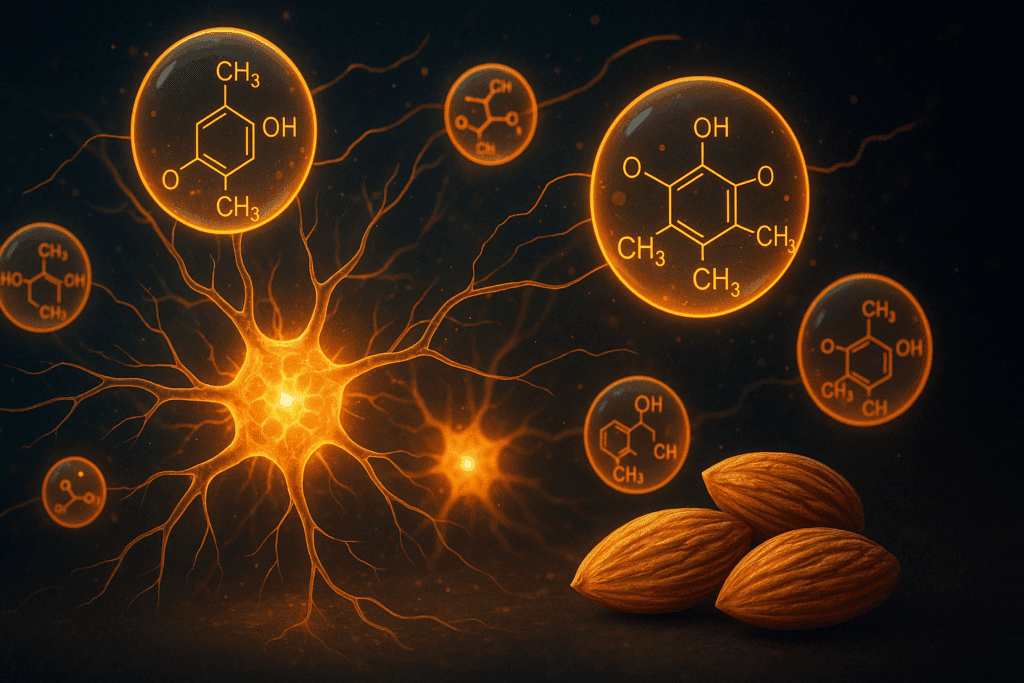Almonds have long been celebrated as one of nature’s most powerful superfoods, but recent nutritional science has brought their energy-boosting reputation into sharper focus. Whether you’re reaching for a handful during your mid-afternoon slump or blending them into a morning smoothie, the question arises: why do almonds provide so much energy? This question isn’t just rooted in their caloric density but also in the complex interplay of healthy fats, micronutrients, and bioactive compounds that work synergistically to sustain both physical and mental performance.
You may also like: Best Herbal Stimulants for Energy and Focus: Natural Uppers That Work Without Caffeine
When it comes to energy, the conversation too often focuses narrowly on sugar or caffeine. But the lasting focus and mental clarity offered by almonds come from a much deeper, metabolically rich composition. Do almonds give you energy in the same way a cup of coffee might? Not exactly. In fact, their impact is subtler yet more sustainable—designed not to spike and crash, but to fuel and fortify. By exploring the nutritional architecture of almonds and their effects on brain function, cellular metabolism, and cognitive endurance, we begin to understand the profound ways in which this small nut powers big mental returns.
Nutrient Density and Bioavailability: The Foundation of Almonds’ Energy Potential
At the core of almonds’ energy-boosting effects is their exceptional nutrient density. A single ounce—about 23 almonds—contains approximately 160 calories. While that number may seem modest, the composition of those calories is what sets almonds apart. They offer an ideal balance of macronutrients: roughly 6 grams of protein, 14 grams of fat (most of which is heart-healthy monounsaturated fat), and 6 grams of carbohydrates, including 3.5 grams of dietary fiber. Unlike empty calories found in processed snacks, every bite of an almond is rich in fuel that the body can use efficiently and gradually.
Crucially, almonds also contain nutrients like magnesium, vitamin E, riboflavin (vitamin B2), and manganese—each playing a vital role in cellular energy production and oxidative defense. Riboflavin, for example, is an essential coenzyme in mitochondrial pathways that convert food into ATP, the body’s primary energy currency. Magnesium, on the other hand, is required in over 300 enzymatic reactions, many of which govern energy metabolism and neuromuscular transmission. These micronutrients don’t just support health in general—they directly facilitate the body’s ability to create and sustain energy at the cellular level.
So, when we ask, “Does almonds give you energy?” the answer is a resounding yes—not because they offer a temporary jolt, but because they are biologically engineered by nature to support sustained metabolic vigor.

The Role of Healthy Fats in Sustained Energy and Mental Endurance
Fats often receive a bad reputation in discussions about nutrition, but it’s essential to distinguish between harmful trans fats and beneficial monounsaturated and polyunsaturated fats. Almonds are an outstanding source of monounsaturated fat, the same type found in olive oil, which is celebrated in the Mediterranean diet for its cardiovascular and cognitive benefits.
Fat is a slow-burning fuel, ideal for providing long-lasting energy without sudden spikes in blood sugar. This metabolic stability is particularly important for those seeking steady focus and mental clarity throughout the day. The fatty acid profile of almonds also contributes to better absorption of fat-soluble vitamins like E and K, further enhancing the nutrient delivery system that supports brain health and endurance.
Moreover, the presence of omega-6 fatty acids in almonds, although often viewed with caution, actually contributes positively when balanced with omega-3s. These fats are involved in the structural integrity of brain cell membranes and play a role in synaptic plasticity—the ability of the brain to adapt, form new connections, and retain information. This connection between almond fats and neurological function helps explain why almonds don’t just support energy in a physical sense but also help sharpen the mind and promote attentional stamina.
Fiber, Satiety, and Blood Sugar Regulation: Energy Without the Crash
Another crucial factor in understanding why almonds provide so much energy lies in their dietary fiber content. Unlike sugary snacks that lead to a quick spike in glucose followed by an inevitable crash, almonds release their energy gradually. The fiber in almonds slows digestion, leading to a more measured release of glucose into the bloodstream. This steadier blood sugar response is vital for maintaining energy levels without the jitteriness or fatigue associated with rapid insulin spikes.
This slow-burn effect is particularly beneficial for cognitive performance. The brain requires a continuous supply of glucose to function optimally, and erratic blood sugar levels can significantly impair memory, focus, and decision-making. Almonds act as a buffer, stabilizing glycemic responses and extending the window of mental sharpness. For people managing insulin sensitivity or aiming to avoid the pitfalls of reactive hypoglycemia, almonds represent an energy source that fuels both body and brain with minimal metabolic disruption.
So when someone asks, “Do almonds give you energy or just make you full?”—the answer is both. The satiety factor prevents overconsumption and energy dips caused by hunger, while the steady carbohydrate release maintains cognitive momentum.

Amino Acids and Protein: Supporting Neurotransmitters and Muscle Performance
Almonds are often overlooked as a source of protein, yet their amino acid content plays a vital role in both muscular and mental energy. With 6 grams of protein per ounce, almonds provide a meaningful dose of the building blocks required for tissue repair, enzyme function, and neurotransmitter synthesis.
One of the key amino acids present in almonds is tyrosine, a precursor to dopamine—a neurotransmitter involved in reward, focus, and motivation. Dopamine is often described as the brain’s “drive” chemical, and its adequate availability is crucial for sustaining attention, enthusiasm, and mental effort. Tyrosine-rich foods like almonds support the production of dopamine under stress, making them particularly helpful during mentally demanding tasks.
Additionally, the protein in almonds contributes to muscle maintenance and post-exercise recovery, which has implications for physical energy levels as well. In this way, almonds serve dual purposes: they support the mind through neurotransmitter production and protect the body through muscle nourishment. The protein-fat-fiber triad in almonds creates a powerful synergy that enhances energy stability, satiety, and cognitive endurance all at once.
Vitamin E and Antioxidants: Protecting Brain Cells from Oxidative Stress
Vitamin E is often discussed in the context of skin health, but its neurological benefits are equally compelling. Almonds are among the richest natural sources of this fat-soluble antioxidant, providing nearly 50% of the Recommended Daily Intake in just one ounce. In the brain, vitamin E acts as a powerful shield against oxidative stress, a process that damages cells and accelerates cognitive decline.
Oxidative stress is not only associated with aging but also with energy loss and mental fatigue. Free radicals can impair mitochondrial function—the very engines of cellular energy production—leading to decreased stamina and mental dullness. By neutralizing these reactive oxygen species, vitamin E in almonds helps preserve mitochondrial integrity and supports ongoing ATP production, keeping both the brain and body energized.
In addition to vitamin E, almonds contain flavonoids and polyphenols that work synergistically with other nutrients to enhance antioxidant capacity. These compounds not only prevent cellular damage but also support the regeneration of other antioxidants like vitamin C and glutathione, amplifying the body’s overall defense system. This protective effect plays a crucial role in maintaining long-term cognitive health and energy availability.
Magnesium’s Role in Energy Metabolism and Cognitive Function
Few nutrients are as central to energy production as magnesium. Every cell in the body requires magnesium to generate ATP, yet it is one of the most commonly deficient minerals in modern diets. Almonds provide a generous dose of magnesium—around 76 milligrams per ounce—helping bridge this gap and supporting the body’s core metabolic functions.
Magnesium is involved in over 300 enzymatic reactions, many of which directly impact how the body converts food into usable energy. It plays a particularly important role in the Krebs cycle, the fundamental metabolic pathway that produces ATP. Without adequate magnesium, energy production becomes inefficient, and fatigue sets in more quickly during both physical and mental tasks.
Beyond its metabolic importance, magnesium also supports cognitive performance. It modulates NMDA receptors in the brain, which are involved in learning and memory, and it contributes to the regulation of stress hormones such as cortisol. By promoting a calmer, more focused mental state, magnesium-rich almonds help sustain mental endurance over extended periods, making them a valuable tool for students, professionals, and anyone seeking enhanced productivity.
Brain-Boosting Synergy: How Almonds Improve Focus and Wakefulness
The energy provided by almonds is not merely about keeping your eyes open—it’s about promoting deep, sustained focus and mental resilience. Wakefulness, in the nootropic sense, is less about stimulation and more about clarity, alertness, and presence. Almonds support these states through multiple, interlocking pathways.
The amino acids, fats, and micronutrients in almonds each play roles in maintaining neurotransmitter balance, which is essential for attentional control and cognitive flow. The dopamine-enhancing effects of tyrosine, the stress-buffering role of magnesium, and the anti-inflammatory action of vitamin E all converge to support mental clarity and reduce mental fatigue. Together, they help explain why almonds are often included in brain-boosting diets and nootropic protocols.
Moreover, almonds contribute to cholinergic function, which is associated with acetylcholine—a neurotransmitter involved in learning, memory, and attention. While almonds are not a direct source of choline, their vitamin B2 and polyphenol content support methylation pathways that facilitate choline metabolism and neurotransmitter synthesis. This makes almonds a smart snack not just for physical energy, but for high-level cognitive tasks such as problem-solving, verbal fluency, and sustained concentration.
Practical Tips for Maximizing the Energy Benefits of Almonds
To fully harness the energy-enhancing properties of almonds, timing, preparation, and pairing matter. For instance, consuming almonds alongside a piece of fruit can create a balanced snack that offers both quick and sustained energy. The fruit provides a small amount of fast-digesting glucose, while the almonds regulate absorption and extend satiety.
Soaking almonds overnight can enhance their bioavailability by reducing phytic acid, a compound that can impair mineral absorption. Lightly roasting almonds can also make them easier to digest while preserving their nutritional integrity. Avoid highly processed almond snacks that include added sugars or oils, as these can diminish their energy-stabilizing benefits.
For cognitive tasks or workouts, eating a handful of almonds 30 to 60 minutes prior can provide a steady release of energy that supports both endurance and performance. In the context of a nootropic or high-performance lifestyle, almonds fit naturally alongside other brain-enhancing foods and supplements, offering a whole-food option that complements more targeted interventions.

Standalone FAQ: Why Do Almonds Provide So Much Energy? Fresh Insights into Almonds for Focus and Wakefulness
1. How do almonds impact mitochondrial function, and why does this matter for sustained energy?
Almonds contribute significantly to mitochondrial health, which plays a key role in how efficiently your cells convert nutrients into usable energy. This is one reason why almonds provide so much energy—they help support the production of ATP (adenosine triphosphate), your body’s main energy molecule. Almonds are rich in nutrients like riboflavin and manganese, which act as coenzymes in mitochondrial energy metabolism. Over time, consistently consuming almonds may help protect mitochondria from oxidative damage due to their antioxidant profile, including vitamin E and polyphenols. This means that almonds not only supply energy in the short term but may also support the cellular machinery that keeps your energy levels more stable as you age.
2. Can almonds help with mental fatigue during intense cognitive work?
Yes, almonds may help reduce mental fatigue, especially when you’re performing tasks that require prolonged concentration. They contain a mix of healthy fats, protein, and micronutrients that help stabilize blood sugar levels, preventing the energy crashes that can lead to mental sluggishness. While caffeine offers a short burst of energy, almonds give you a more sustained and nourishing lift, particularly valuable for people prone to burnout or stress-related fatigue. Additionally, the magnesium in almonds supports neurotransmitter function and can enhance your ability to focus without overstimulation. That’s one more reason why almonds provide so much energy for the brain during cognitively demanding situations.
3. How does the fat content in almonds support long-lasting energy without causing drowsiness?
The monounsaturated fats in almonds are slow-burning fuel that your body metabolizes gradually, helping to sustain energy levels without the sharp spikes and drops associated with sugary snacks. Unlike heavy meals that can make you feel sleepy due to insulin and digestive overload, a modest serving of almonds offers steady fuel that supports alertness. This is why the answer to “do almonds give you energy” is a clear yes—especially for people who need to stay productive throughout the day. These healthy fats also play a role in stabilizing hormone levels, which can indirectly affect your overall stamina and mental clarity. In fact, a small handful of almonds between meals can help you avoid the mid-afternoon slump that tempts many into over-caffeination.
4. Are almonds a good energy source for people on low-carb or ketogenic diets?
Absolutely. Almonds are particularly well-suited for individuals following low-carb, keto, or even intermittent fasting protocols. Their high fat and protein content—paired with relatively low net carbs—makes them ideal for promoting ketone production, the alternative energy pathway used when carbs are restricted. This is a prime example of why almonds provide so much energy in a way that aligns with modern metabolic health strategies. Moreover, they deliver a satiating effect that helps curb cravings and extend fasting periods, which can further support metabolic flexibility. So if you’re avoiding carbs but still need an energy-boosting snack, almonds are one of the best natural options.
5. How do almonds interact with adrenal health and stress-related energy depletion?
Chronic stress can deplete key nutrients like magnesium, vitamin B2, and zinc—nutrients almonds happen to be rich in. By replenishing these stress-sensitive micronutrients, almonds may support adrenal health and help regulate cortisol, the body’s main stress hormone. Many people who ask “does almonds give you energy” are really looking for ways to combat stress-induced fatigue, and almonds deliver on this front by nourishing the body’s natural stress response system. Additionally, almonds’ healthy fats provide a sense of calm satiety, which may reduce emotional or stress-induced eating. Incorporating almonds into your daily routine can therefore act as a subtle, dietary way to buffer against the energetic drain of modern life.

6. Can almonds support endurance during physical exercise or sports performance?
Yes, almonds are a great pre- or mid-workout snack for athletes and fitness enthusiasts. Their combination of protein, fat, and micronutrients like potassium and magnesium can help maintain electrolyte balance, reduce muscle cramps, and sustain physical energy. Almonds also contain arginine, an amino acid that supports blood flow and oxygen delivery during intense movement. This multifaceted support explains why almonds provide so much energy not only for cognitive tasks but also for athletic performance. In contrast to quick-burning carbohydrate snacks, almonds offer a more stable source of fuel—especially for endurance activities like hiking, cycling, or long gym sessions.
7. How do almonds affect blood sugar regulation and its connection to energy levels?
Almonds help slow the release of glucose into the bloodstream due to their fiber, protein, and healthy fat content. This glycemic-stabilizing effect reduces energy spikes and crashes, keeping your mind clear and your energy even. Many people wonder, “do almonds give you energy even if you’re hypoglycemic?”—and the answer is yes, as long as they’re paired with balanced nutrition. Over time, incorporating almonds into meals or snacks may even help improve insulin sensitivity, especially when combined with a diet rich in whole foods. This metabolic balance plays a major role in how energetic—or fatigued—you feel after eating.
8. What role do almonds play in brain energy and cognitive longevity?
Almonds are high in vitamin E, which is known for its neuroprotective effects, and recent studies suggest it may play a role in preserving cognitive function as we age. But beyond protection, almonds also fuel brain energy production through nutrients like magnesium and niacin, which support neurotransmitter synthesis and cellular respiration. If you’re asking “does almonds give you energy in the form of better mental performance?”—the answer is a definite yes, particularly when almonds are part of a consistent brain-healthy diet. They also contain tyrosine, a precursor to dopamine, which may enhance mood and motivation. That makes almonds a smart snack not just for today’s tasks but also for long-term mental clarity.
9. Can almonds be used as a natural energy support in shift work or irregular sleep schedules?
For people who work overnight or follow inconsistent sleep patterns, almonds can be a secret weapon. Their nutrient profile helps mitigate the energy-depleting effects of circadian misalignment by providing steady nourishment without stimulating the nervous system. This is especially helpful when you want to stay awake without relying heavily on caffeine or sugar. The reason why almonds provide so much energy in these scenarios lies in their ability to stabilize metabolism and support adrenal recovery. Shift workers often experience blood sugar swings and fatigue—almonds help smooth those curves without overstimulating the body, offering a gentler, more sustainable solution.
10. What’s the best way to incorporate almonds for daily energy without overdoing calories?
Portion control is key. While almonds are calorically dense, a small handful (about 23 almonds or 1 ounce) is usually enough to deliver their energy-boosting benefits without excess calories. You can add sliced almonds to oatmeal or yogurt in the morning, toss a few into a salad for lunch, or enjoy them plain as a mid-afternoon snack. If you’re wondering “do almonds give you energy even in small amounts?”—the answer is yes, because their nutrient density packs a powerful punch even in modest servings. For maximum benefits, choose raw or dry-roasted varieties without added oils or sugars, and pair them with hydrating foods or herbal teas to support digestion and absorption.

Conclusion: Why Almonds Provide So Much Energy—and Why That Matters for Your Brain and Body
Understanding why almonds provide so much energy is more than a matter of counting calories or macronutrients. It’s about appreciating the complex biochemical orchestra that occurs when we consume foods aligned with our body’s natural energy systems. Almonds stand out not just for their nutritional profile, but for how their components—healthy fats, fiber, protein, magnesium, vitamin E, and antioxidants—work together to support sustained energy, mental focus, and neurological resilience.
When people ask, “Do almonds give you energy?” they’re usually thinking about physical stamina or avoiding an afternoon crash. But the real beauty of almonds lies in their ability to support both the brain and body over time. Unlike caffeine or sugar, which offer short bursts of energy, almonds provide a grounded, enduring sense of vitality that can enhance daily productivity, cognitive sharpness, and emotional balance.
So does almonds give you energy? Absolutely—but more importantly, they give you the kind of energy that supports not just movement, but meaning. By making almonds a regular part of your diet, you invest in energy that lasts—powering your thoughts, actions, and ambitions with clarity and purpose.
Was this article helpful? Don’t let it stop with you. Share it right now with someone who needs to see it—whether it’s a friend, a colleague, or your whole network. And if staying ahead on this topic matters to you, subscribe to this publication for the most up-to-date information. You’ll get the latest insights delivered straight to you—no searching, no missing out.
Further Reading:
Cognitive Effects of Almond Consumption: A Review of Animal Studies
9 Evidence-Based Health Benefits of Almonds
Can eating almonds daily really help in boosting brain health?


